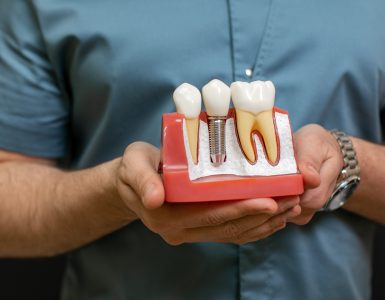If you are thinking about getting pregnant, or are already pregnant, it pays to be aware of how the hormonal changes during pregnancy can affect your teeth and gums and the importance of maintaining good dental health during that time to protect the health of you and your baby.
You’re thinking about becoming pregnant
Maintaining good oral health before you become pregnant can help minimise problems with your teeth and gums. Research has shown that gum disease in pregnant women could potentially put the baby at risk of premature birth or low birth weight. It is important to brush your teeth twice a day and floss daily, eat a healthy diet and avoid alcohol and smoking. A check-up with your dentist to ensure any necessary treatments are attended to before you become pregnant is also a good idea.
What about during pregnancy
Natural hormonal changes through pregnancy can increase the risk of oral health problems. You may notice a change in the health of your gums during the first trimester. You possibly are also experiencing some morning sickness and/or food cravings. We’ll have a look at these issues and also ways of minimising any damage to your teeth and gums.
Teeth and gum problems
- Gingivitis. You may notice redness and swelling caused by inflammation of your gums. You may also notice that your gums bleed when you brush or floss your teeth. Many pregnant women experience this and fortunately it is only temporary. If you’ve maintained good oral hygiene before pregnancy, chances are it may not affect you. If you are suffering with gingivitis, you should ensure you have a check-up with your dentist.
- Periodontal or gum disease. This can develop if gingivitis is left untreated and is an infection in the gums. It can weaken the tissues that hold your teeth in place and shouldn’t be ignored. As mentioned above, it can also increase the chances of premature birth or low birth weight which can risk the health of your baby, so this should be dealt with immediately.
- Pregnancy tumours. These are red lumpy lesions that form along the gum line and between the teeth. They are harmless and should go away once you have given birth.
- Loose teeth. The high levels of pregnancy hormones can temporarily loosen your teeth by affecting the issues and bones that hold your teeth in place.
- Cavities. You may notice that you are more susceptible to cavities when you are pregnant.
Morning Sickness
Not all women experience morning sickness, but if you are one of them your teeth may be exposed to too much stomach acid caused by vomiting or reflux, which can have an erosive effect on your teeth. Although your first thought might be to brush your teeth after vomiting, because your tooth enamel has been softened and weakened by the stomach acid, you could damage it. It is recommended you wait at least 30 minutes before brushing your teeth. Instead you can rinse your mouth out with water and smear some fluoride toothpaste on your teeth to refresh your mouth and strengthen the enamel. You could also chew some sugar free gum or stimulate saliva to neutralise the acid and wash it away.
Food Cravings
You may find yourself with some unusual cravings, like sugary or acidic foods and drinks. As these can increase the chances of tooth decay, it is a good idea to try to avoid them and snack on foods low in sugar instead. If you simply cannot reign in that craving for something sugary, try some fresh fruit instead and make sure you either rinse your mouth out with water or brush your teeth afterwards.
Taking care of your teeth while pregnant
- Regular dental check-ups. It is important that you have a dental check-up while you are pregnant. Routine dental treatment is perfectly safe, but it is important that you let your dentist know that you are pregnant so that can take any extra precautions that may be necessary. Gum issues and cavities need to be treated as soon as possible to avoid any risk to your baby’s health.
- Maintain good oral hygiene. It is important that you maintain your teeth by brushing morning and night and flossing once a day to avoid the build-up of plaque, even if brushing causes your gums to bleed. The bacteria that causes plaque can be can be passed on to your baby during pregnancy and after birth and can cause early childhood decay. Some women may find brushing their teeth makes them gag. If gagging is a problem for you, try using a toothbrush soft small-headed toothbrush like the ones made for children. Brushing later in the morning might help, take your time and focus.
- Eat a healthy diet. It is important for you and your growing baby that you get all the important nutrients you need. As your baby grows, its calcium demands are high. Its teeth start developing around 3 months, so increasing the amount of calcium you consume is important for your baby’s teeth and bones. Eat plenty of dairy products, or if you are unable to have dairy, there are other sources such as calcium fortified soy, almond or other types of milk, cheese and yoghurt. Vitamin D helps the body utilise the calcium, so eat plenty of fatty fish, eggs, breads and cereals. Also include in your diet plenty of fruits, vegetables, lean meats, beans and grains. Limited your intake of sugary foods and drinks and ensure you drink plenty of water.
If you have any questions or concerns about your oral health during your pregnancy, contact your dentist who will be more than happy to discuss these with you.




